04 October 2022
Originally published
24 June 2022
Source
Before the war, Kyiv had a vibrant, burgeoning creative scene. But then Russia’s attack suddenly forced the young generation to make a choice: flee or fight for freedom?
Since he was a child, Vlad Shast has dreamed of leaving Ukraine, his native country, which has never provided a safe home to people like him. Shast does not fit the classic role models of women and men shared by many of his compatriots. “I’m neither a man nor a woman, but both at the same time. I have a bit of both sides and don’t want to have to choose one or the other,” says the 26-year-old, who used to earn his living as a stylist and performance artist in Kyiv until 24 February. But when Russia attacked Ukraine, Shast joined the Territorial Defence Forces, which were formed in 2014 in response to the outbreak of the war in eastern Ukraine and are now officially part of the Ukrainian Armed Forces. He proudly wears a patch with his combat name on his camouflage jacket: Britney.
His friends abroad were bewildered and asked him: “Why are you staying?” “My relationship with Ukraine is conflicted,” Shast answers. “But I know I’m doing the right thing. I’m not standing up for the Ukrainian nation, but for humanity. Russian aggression is not just an attack on Ukraine, it is an attack on the civilised world,” says Shast. “If I want to live in a peaceful world, if I want a future for my family and my friends, I have to stay here and fight back against this injustice.”
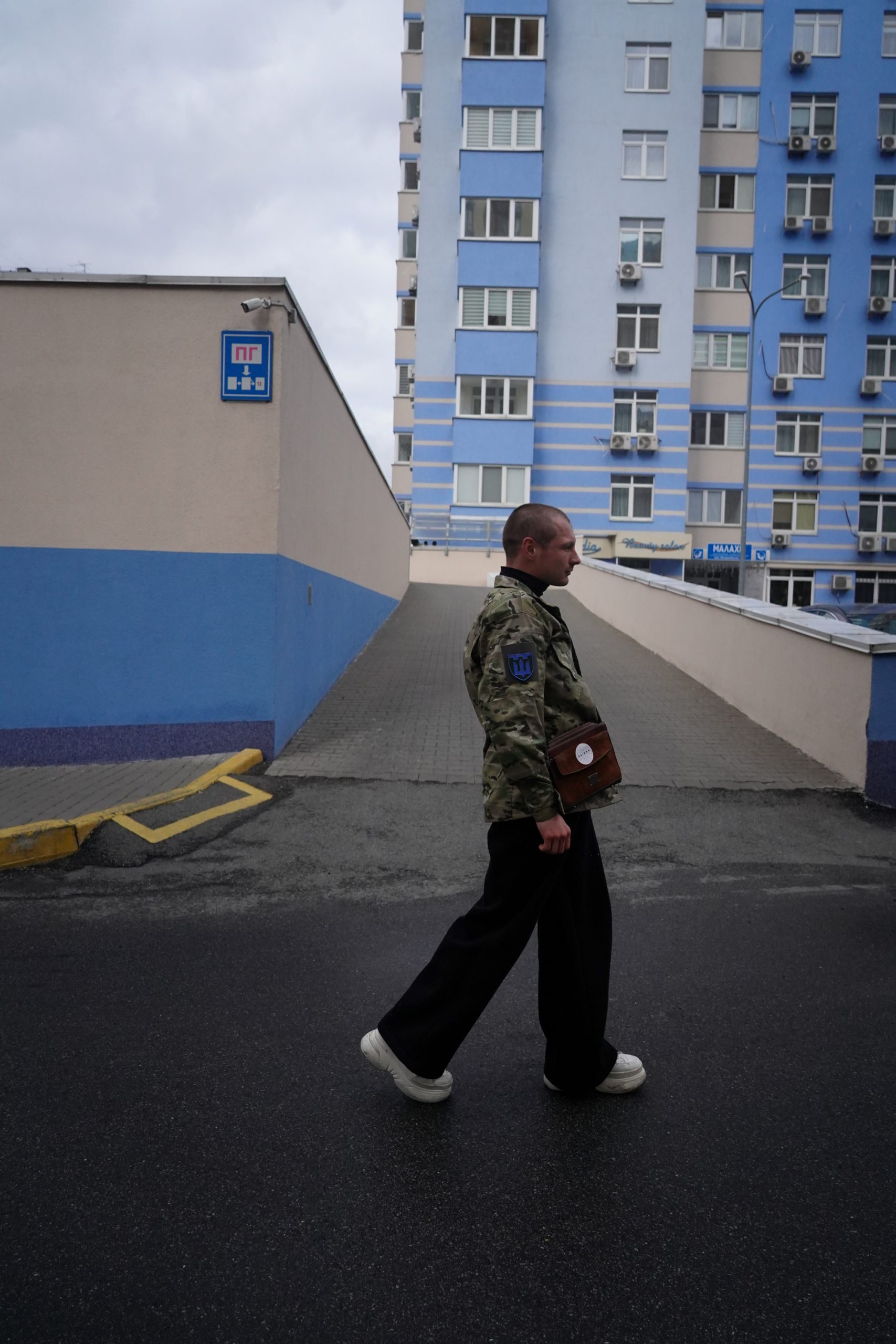
“My relationship with Ukraine is conflicted. But I know I’m doing the right thing. I’m not standing up for the Ukrainian nation, but for humanity,” Vlad Shast explains.
With the sleeves of his army jacket rolled up, wearing platform sneakers and with a touch of glitter powder on his face, Shast enters the hip café in Kyiv’s central shopping street. Surrounded by old books and vintage typewriters, its young crowd broods over chessboards and MacBooks while sipping cappuccinos, lost in thought. Shast confidently places his Plexiglas donation box on the counter, over which the waitress is just passing a homemade quiche.
Shast does not fight on the front lines but volunteers to help needy people in the region, providing them with basic necessities. “Obijmi”, or Embrace, is the name of the charity organisation he founded in early May. More than three months into the war, many people have lost their jobs and livelihoods. So Shast and his team of 20 bring food, clothes and medicine to Kyiv’s suburbs, support the fighters and, whenever possible, also care for pets that have been left behind. A few days later he returns to make sure the relief supplies reached those who need it. “Ukraine is corrupt, and there are still people who get rich at the expense of others. It is what it is. But now we are able to crack down on these people. And we will build a new country and make it better.”
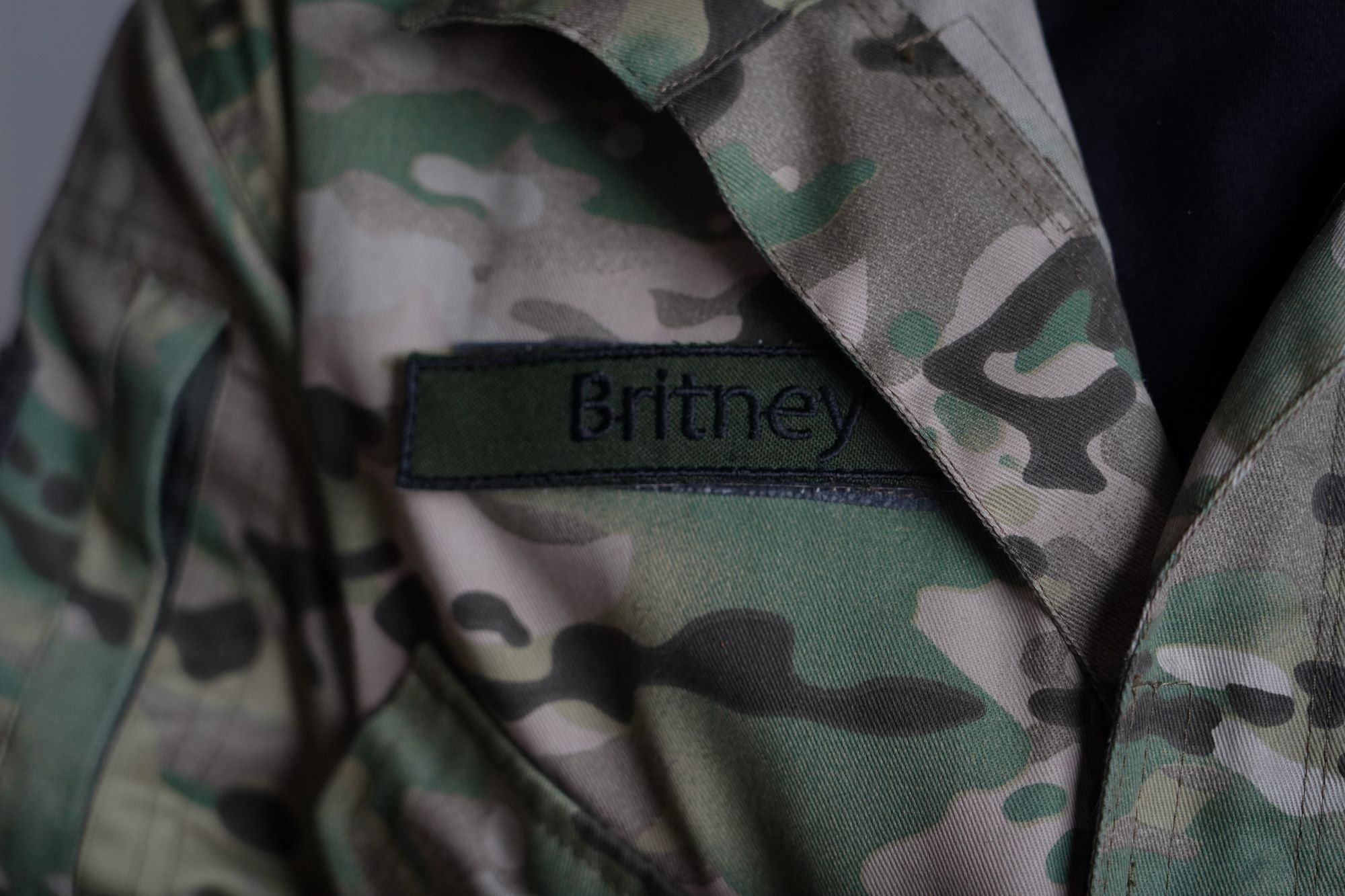
Shast joined the Territorial Defence Forces, his combat name: Britney.
Shast knows what he is talking about. He grew up in a village in the central Ukrainian oblast of Kirovohrad. Until he was 16, he went through his own personal nightmare: “I was bullied every day. I didn’t know that I was non-binary at the time; I had never heard of the term. Constantly being treated with hostility, however, made me a stronger person.” Today, queer people like him enjoy a little more acceptance in Ukraine. At least, says Shast, the government’s approach towards them is not abrasive as is the case in Russia.
“Ukraine is corrupt, and there are still people who get rich at the expense of others. It is what it is. But now we are able to crack down on these people. And we will build a new country and make it better.”
Cities like Kyiv now also offer safe spaces for the community, such as the Kyrylivska Club, whose opening in 2019 many saw as the unofficial birth of Ukrainian queer culture. “Finally we have a place where we can embark on an inner quest to find out who we are, who we want to have sex with, or if we want to have sex at all. You can change into a different person and talk about it. That’s the biggest difference with Russia.” But Shast has had to travel a long way to get there. “In my darkest hours I was addicted to alcohol and amphetamines. That went along with my club life and trying to run away from myself because I didn’t get the level of acceptance and help around me that I needed.”
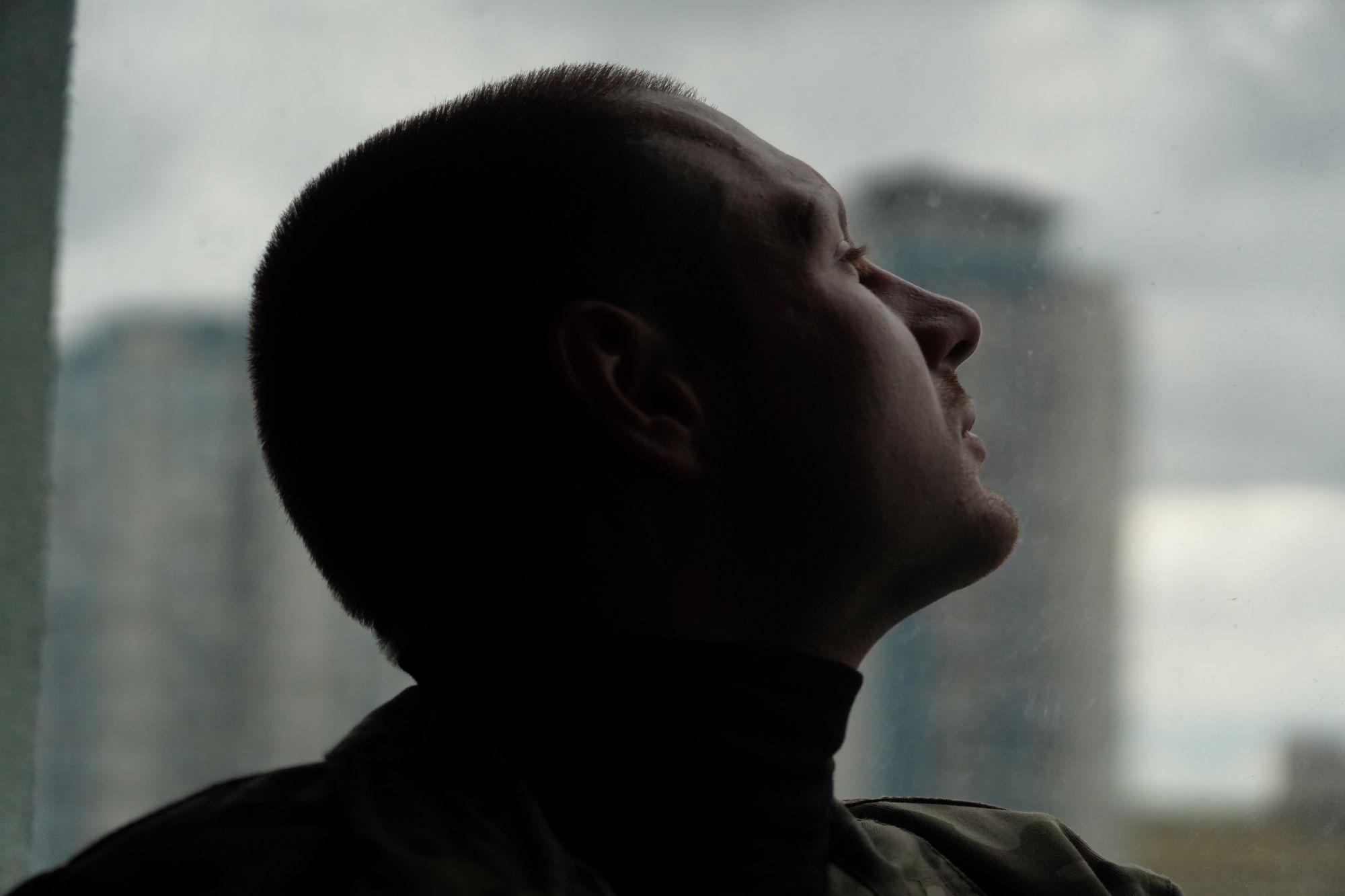
It was only a month ago that Shast returned to his flat on the 16th floor of a sky-blue apartment building near the railway station. Before that, he and his mother had been living in a shopping centre for weeks. Since the air raids on Kyiv began, they have been very afraid of living in a high-rise.
It was only a month ago that Shast returned to his flat on the 16th floor of a sky-blue apartment building near the railway station. Before that, he and his mother had been living in a shopping centre for weeks. Since the air raids on Kyiv began, they have been very afraid of living in a high-rise. In the living room, half-burned incense sticks, a peaceful-looking Buddha statue, feather boas and extravagant costumes are reminders of pre-war times – when there was still room for personal fulfilment, self-care and parties. “My old life is on hold,” Shast notes dryly. Today, he devotes his entire energy to those who are less fortunate than he is.
The Russian war of aggression has already cost tens of thousands of lives and terrorised the population of an entire country. Young Ukrainians who previously had prospects in cities like Kyiv were suddenly faced with a choice:flee or fight for freedom?
Michelle and Nicol Feldman, two well-known street artists, also decided to stay. The fraternal twins, who have already left their mark on many of the city’s walls with their graffiti and murals, sport dyed blond hair, baggy trousers and sturdy shoes that can be worn for skating – or for climbing on Czech hedgehogs, which now dominate the Kyiv streetscape. Until recently, the sisters lived the relatively carefree life of 25-year-olds. They were interested in art, they travelled, partied. “We just wanted to enjoy our lives,” says Nicol. “Since the war started, we’ve been outrageously furious.” They are furious about Russian talk of denazifying Ukraine and about Putin denying the country its right to exist. And they are furious that more than 14 million Ukrainians have so far had to flee: five million have left the country, the rest seeking shelter in other regions within Ukraine.
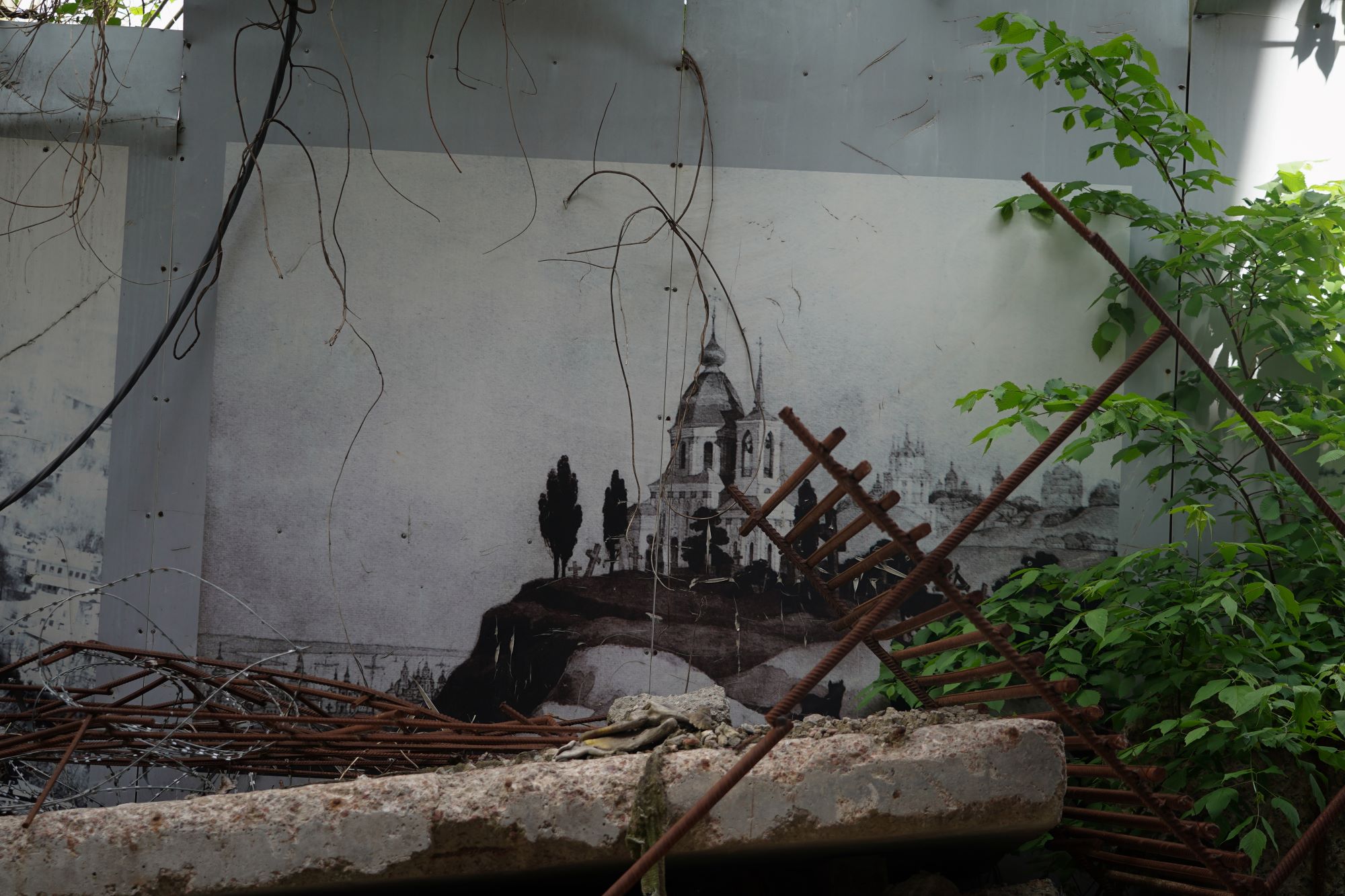
The two well-known street artists, Michelle and Nicol Feldman, have already left their mark on many of the city’s walls with their graffiti and murals,
The two sisters grew up in a Jewish family in the city of Dnipro. Their mother is a painter, one brother is an actor and the other a tattoo artist. And father Boris is the former vice president of the Slavyansky Bank. In the noughties, he was sentenced to four years in prison under then-President Leonid Kuchma. Kuchma’s tenure was marred by numerous corruption scandals and the curtailment of media freedom. Feldman’s conviction led to an outcry among human rights activists claiming that he had been denied a fair trial. But the protests did not help, Michelle’s and Nicol’s father ended up behind bars. “We were eight years old at the time and we gave him a painting,” recalls Michelle. “That’s how we started painting.”
“When you just live your life and everything is alright, you don’t care about your own political history. Then, suddenly, it starts to affect you and you realise that you have to learn and educate yourself.”
Eight years ago, after the Maidan revolution, the two sisters moved to Kyiv. At first, they both lived in a hostel called Dream Story. “For months, we shared a room with eight other people, but we didn’t mind because we come from a big family ourselves,” Nicol explains. Sometimes they speak Russian, sometimes Ukrainian. They have never taken an interest in politics, the two sisters say. “When you just live your life and everything is alright, you don’t care about your own political history. Then, suddenly, it starts to affect you and you realise that you have to learn and educate yourself,” says Nicol. During our conversation, the siren starts to wail in the city, a daily accompaniment to war. “We are already used to the sound. We are used to the fear. But every day we wake up in Kyiv, we are happy to be here,” says Michelle. Their art deals with war, or with Ukrainian topics and symbols. And they are not alone in this.
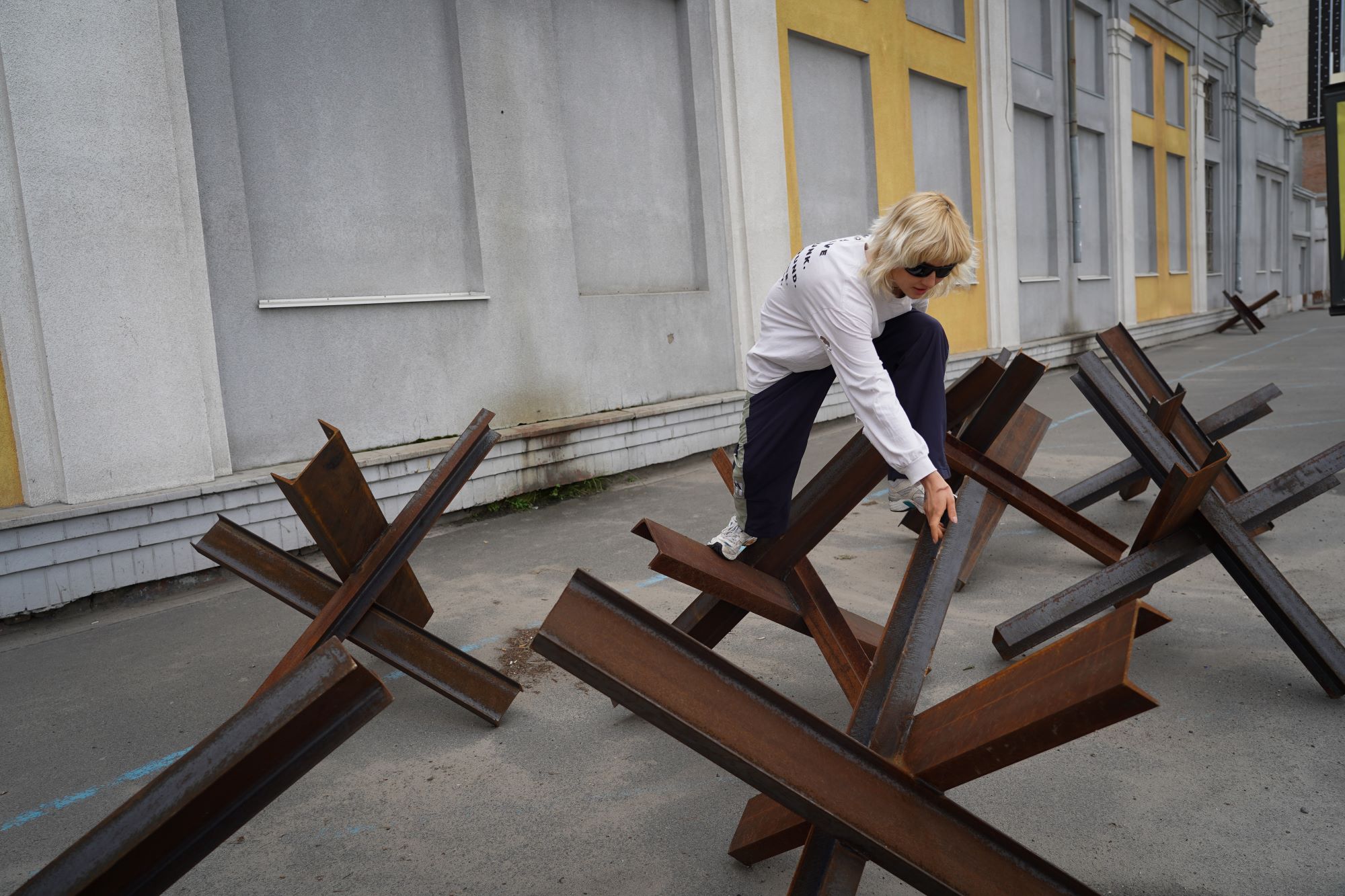
Until recently, the sisters lived the relatively carefree life of 25-year-olds. They were interested in art, they travelled, partied.
On a sunny day in May, the kind that makes you want to spend time with friends in the park, Vitalii Symonenko works alone on this tracks. Since the war started, the DJ has often forgotten to leave his flat on the fourth floor of a Soviet building. Symonenko is in his mid-30s, has short-cropped hair and wears a silver earring. Walking into the living room, he makes his way past countless sneakers, Dr. Martens, leather jackets and potted plants scattered across the floor, not all of which have survived the past few months intact. Stylish scraps of cloth are provisionally fixed to the walls, for the cat to scratch. It took many months and discussions with the owner before he and his partner were finally allowed to remove the many layers of post-Soviet wallpaper and PVA glue and furnish the flat to their taste. Once in the study, the tall, lanky man sits down in a hammock, rocking back and forth in front of the windows, which – as is customary these days in Ukraine – are secured with tape to protect against glass splinters in the event of air raids.
Despite nightly curfews and daily air alerts, the atmosphere in Kyiv is different from that at the beginning of the war, when the attack on the capital was still in full swing. Many people have returned and many pubs and restaurants have reopened. Many, not all. “Even now, the cops are still trying to mess with us. They frisk us because they think we’re smoking pot. The war goes on, but they try to arrest people for smoking weed,” says Symonenko. For nine years, he has been DJing in Kyiv, a city that was often dubbed “the new Berlin” before the war of aggression started. This was especially true of the trendy Podil district with its clubs, bars and creative people, like Symonenko, who work there.
“Wander just five kilometres out of town, however, and you’re faced with post-Soviet rudeness. And you realise that you live in a bubble that makes you easily forget where you actually are,” he says. Before the war, he could perhaps accept the comparison with Berlin with an ironic wink. Today, that is no longer possible, if only because of Germany’s political stance. “Berlin is beautiful, the atmosphere is special. Maybe I’ll go there again sometime,” says Symonenko. But the German government’s hesitant political course is a mystery to most Ukrainians. “Many of these ‘sophisticated’ societies in Europe are not willing to actively defend democracy and freedom, but take them for granted. What many leftists do not understand: to us, surrender means death.”
“Many of these ‘sophisticated’ societies in Europe are not willing to actively defend democracy and freedom, but take them for granted. What many leftists do not understand: to us, surrender means death.”
Like every man of military age, he was in shock on 24 February and faced with the question: how to move on? Escape was not an option as the government had declared martial law. He and his partner spent the first three nights in the basement of their apartment building. Then they packed their things and fled to Lviv, towards the Ukrainian-Polish border. “We went to the shooting range and taught ourselves how to use a gun. It would just be incredibly stupid if we didn’t know how to shoot in the event of an attack by the Russians.”
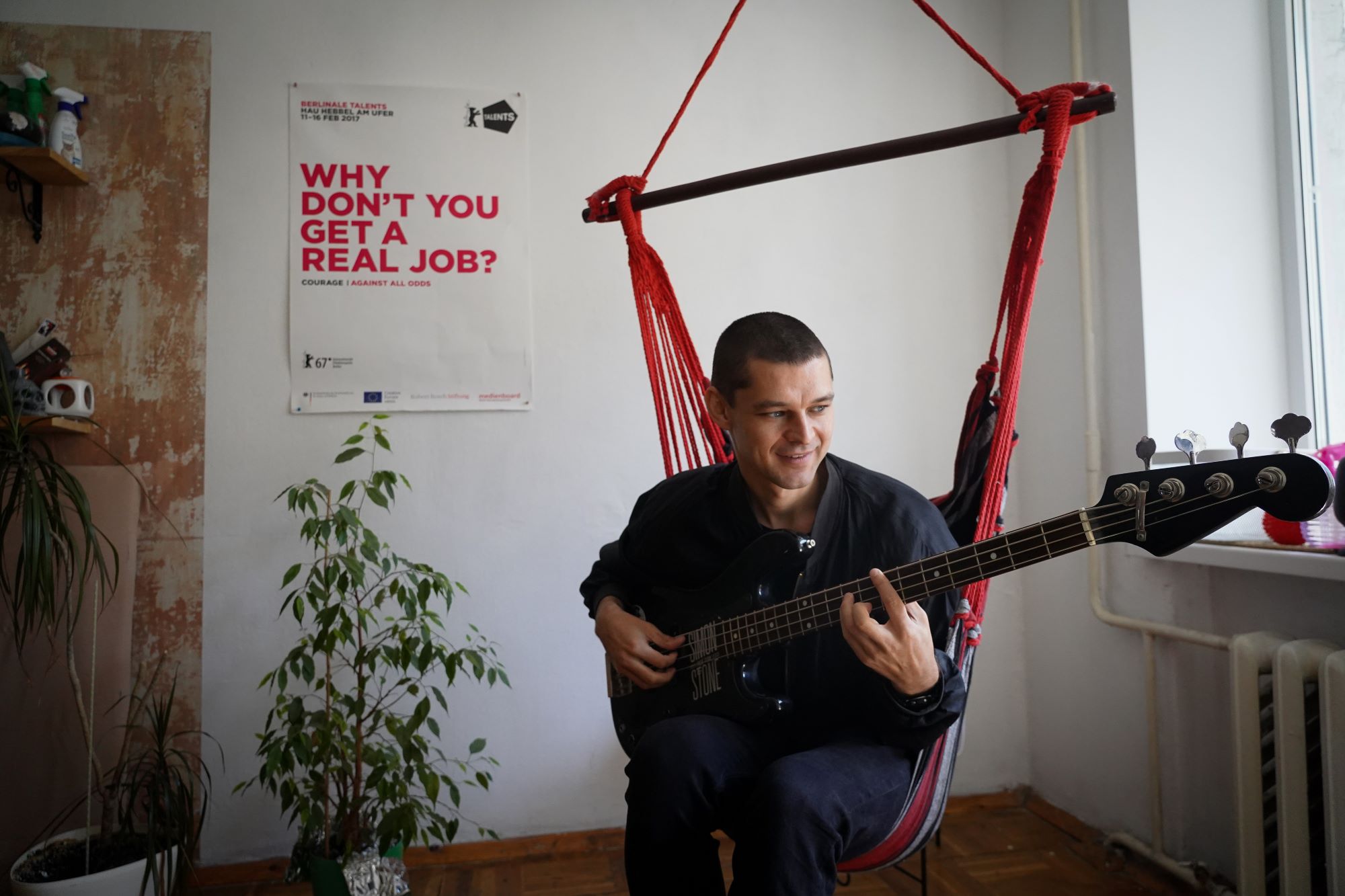
Vitalii Symonenko grew up in Luhansk. Ten years ago, when there was no war in eastern Ukraine, Symonenko thought differently about Russia. He even lived in Moscow for some time. And he has relatives there, although none of them have contacted him since the Russian troops attacked his country. Today, he no longer wants to speak Russian, his mother tongue.
Symonenko is no stranger to what is currently happening in Ukraine. He grew up in Luhansk, in the eastern Ukrainian Donbas region, which has been under Russian control for years and where fighting has been going on since 2014. His parents are still there. The last time he saw them was in August of the previous year. “I invited them to the Carpathians, to western Ukraine, because I wanted them to see our culture and be inspired. And it worked. They were pondering all the time, reflecting,” says Symonenko. But his parents have spent their whole lives in Luhansk, where their work, their property, their friends are. In their later years, people don’t move to a new place that easily, or start a new life. Symonenko explains that he needs to be careful with what he says. “It has often happened that I spoke my mind in radio interviews and my parents were threatened afterwards. They are in-between. They are not Russians. But they are also no longer Ukrainians either. They live in an area where the rouble has been introduced and the Russian military is in control. Russian propaganda is like a plague.” Ten years ago, when there was no war in eastern Ukraine, Symonenko thought differently about Russia. He even lived in Moscow for some time. And he has relatives there, although none of them have contacted him since the Russian troops attacked his country. Today, he no longer wants to speak Russian, his mother tongue.
His techno sounds booming from the loudspeakers, he sits in front of his PC, focused. Many of his neighbours have fled, he says, but those who have stayed are accommodating when it comes to his loud music. “Making music is like magic. It appears out of nowhere,” he says enthusiastically. He used to play in an indie rock band but ventured into techno five years ago. “Now is not the time to party. It would feel wrong to party.” This does not stop him from producing music. One of his latest tracks is called “Russky voyenny korabl, idi na khuy”, a tribute to the men of the Ukrainian border guard on Snake Island in the Black Sea. On the first day of the war, they were radioed by the Russian warship Moskva to surrender. Their response to the Russian attackers: “Russian warship, go fuck yourself.” The audio clip of the exchange has gained cult status in Ukraine and can now be spotted on T-shirts, socks, car windows and house walls all over the country. “The phrase stands for our resistance,” says Symonenko. “I was in shock, like everyone else. But when I heard that phrase, I said to myself, okay, it’s time to do something. Time for beats.” He wants to do ten in total. “The last one is to be released when Ukraine wins the war.”
Original in German. First published in the #02/2022 (June) issue of period.
Translated into English by Barbara Maya.
This text is protected by copyright: © Daniela Prugger / period. If you are interested in republication, please contact the editorial team. Copyright information on pictures, graphics and videos are noted directly at the illustrations or on top of the article. Cover picture: Until recently, the sisters lived the relatively carefree life of 25-year-olds. Photo: Astrig Agopian